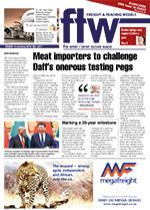Given the international shortage, now is the ideal time to increase South African wine prices and cash in on the exportfriendly exchange rate. This is according to Vinpro wine cellar manager Christo Conradie who told FTW that current market forces demanded an upward push in South African wine prices. “We are facing a shortage domestically and internationally (around 8% by volume). South Africa has earned a solid reputation for producing good quality wines. It is now time to make a structural correction in our pricing. This is a great opportunity for us to negotiate better export deals, which would benefit local wine producers,” he said. Conradie explained that currently the country had no trouble with its export volumes or available inventory. “The challenge is going to arrive in the coming season. At this stage, we can’t say for sure to what extent our 2018 harvest will decrease. It could be between 10% and 15%. But we are not alone; there has been a nosedive in the harvests in France, Italy and Spain.” He said the ripple effect from the lower yield was “definitely” going to be felt locally from the second quarter of 2018, when retail price hikes of between 7% and 10% were expected, unless the major retailers chose to absorb these escalations. “We are at the same point we were in 2012 when we had our lowest inventories and stock levels in the system. But back then we exported what we could at discounted rates. The industry is better informed now and better geared to make educated decisions. We must tell our European export destinations that we are facing a shortage.” Conradie said South Africa’s German and UK export markets, which also imported wines from France, Spain and Italy, were now looking elsewhere. “They will dip into wines from anywhere in the southern hemisphere, be it Chile, Argentina, South Africa, Australia or New Zealand.” He reasoned that lower export volumes should be exported at higher international prices, which would mean increased revenue streams for wineries and producers. “If not, we are facing a difficult arm wrestle between the trade and the wineries.” Increasing prices is also critical because South African wine producers have to deal with higher inflation. “Inflation in Germany and the UK is approximately one or two percent. They are not used to inflation and don’t understand it, yet we need to compete there. We have to move from the bottom shelf to the higher shelves at higher price points. And we must not only compete on price, but also on the quality inside the bottle,” he concluded.

